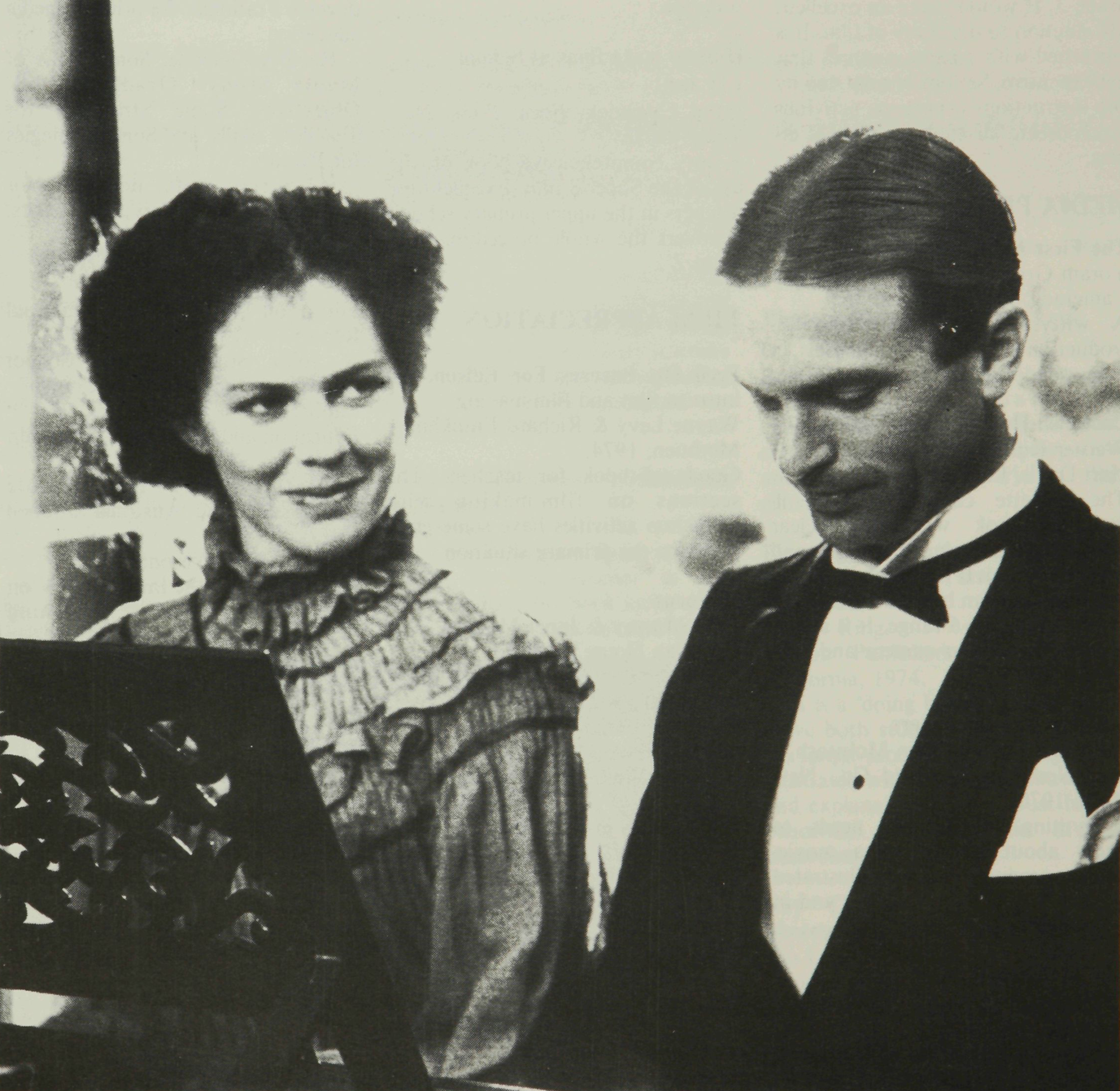It has always seemed to me that with rare exceptions, today’s male Australian film directors have nurtured from the earliest stirrings of their well-preserved puberty three ardent ambitions which are integral to their careers.
These are
1. To make films with naked ladies,
2. To make naked ladies,
3. To make films.
Witness the period Penthouse vignettes in Picnic at Hanging Rock and the naked moonlit romp which surfaced in Dimboola (to the surprise of author Jack Hibberd). And recall the slick and offensive logo of half a naked lady used by the Australian contingent at Cannes in 1978.
No wonder the Australian Film Development Corporation thrice rejected a project to film Miles Franklin’s My Brilliant Career with Margaret Fink as producer, Gillian Armstrong as director and Eleanor Witcombe as screenwriter. Fortunately Margaret Fink found alternative funding to produce what has been ambiguously called ‘a women’s film’.
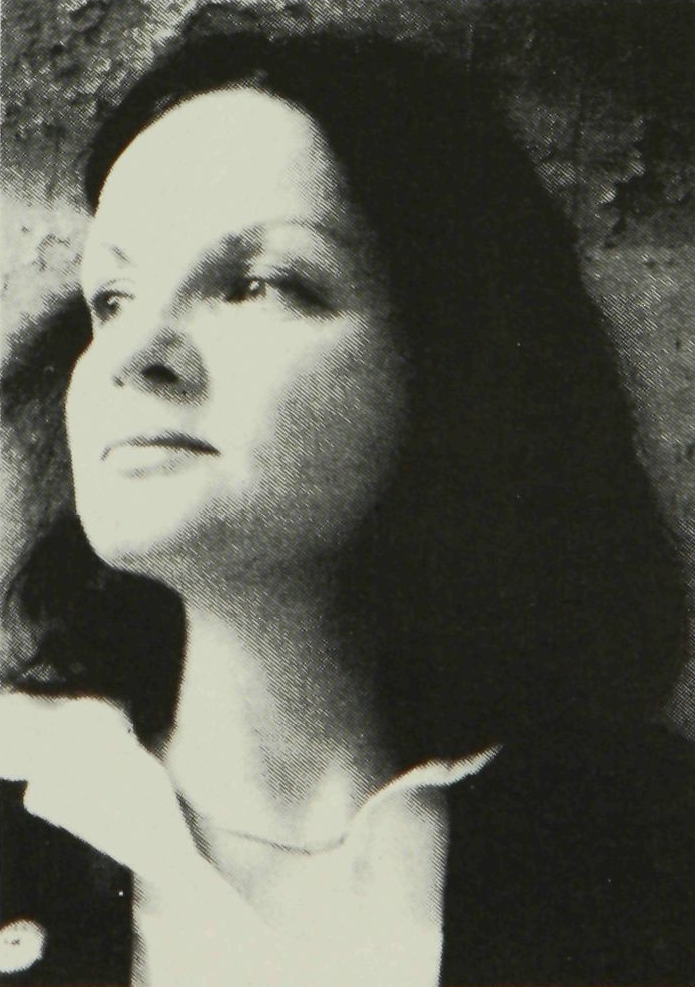
My Brilliant Career is as much a women’s film as Pride and Prejudice, Emma and Middlemarch are women’s books; not because it is produced by women but because it is produced by women of sensitivity, insight and ability to communicate their vision in their chosen creative medium.
The film establishes its reality quickly and firmly. The dialogue is spare, the actors eloquent in facial and bodily expression, the landscape and interiors evoke social conditions and the values of the time. Emotions and tensions are communicated through the pace and selectivity of the camera – all with a nice economy that concentrates significance and gives momentum to the film.
To see these qualities in detail, let’s look at three areas of the film:
I. The introduction to the viewer of the young and dissatisfied Sybylla on her family’s farm;
2. her romantic attraction to Harry Needham which occurs when she leaves the farm for more civilized surroundings where new experiences extend her world, yet present limitations foreseen and unforeseen;
3. her maturing and making an adult choice.
The early sequences of the film establish the confined lives led by women in the bush, the heavy work demands on both sexes, and the selfish yet logical desire of Sybylla to escape.
The film moves from an exterior shot of a small farmhouse blasted by a windstorm in a desiccated landscape to an interior of cramped spaces and burnt colours where the sound of Sybylla’s dogged piano practice creates discord in every sense of the word.
A moment before we have seen her engrossed in the idea of a literary career, surrounded by an arrangement of Victorian ephemera which is pinpointed quickly but significantly to indicate the romantic inflation of her fantasy.
Presently the camera contrasts these aspirations with the unpleasant realities of rural life by dwelling on the squelching, squirting teats of a cow, and then on the resentful face of Sybylla the milkmaid. Her mother, tired and strained as always, approaches and impassively asks her daughter to ‘go and get your father’. Sybylla’s instant and angry compliance sends the milk flying.
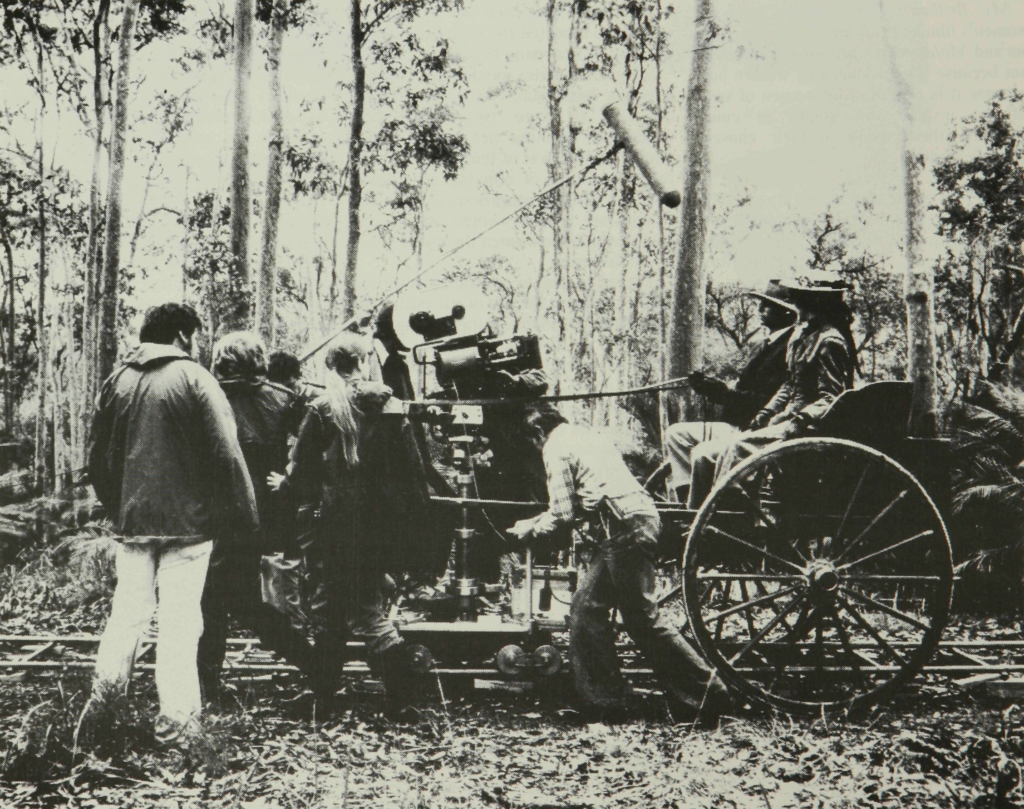
The Bush Wife
From this short sequence we understand that getting her father will be an even more distasteful job than milking, and that even her mother has long since accepted the father’s binges as just one of her many burdens.
Sybylla hesitates momentarily outside a rough bush pub. She is summoning courage to face the humiliating experience awaiting her inside – the double humiliation of fetching a boozing father and also of entering an all-male haven, a crudely gregarious place where women are neither wanted nor needed, and of which the women themselves have no counterpart.
The scene makes us aware of a further constriction on the life of the bush wife, and of the possibility of there being some validity to Sybylla’s claim to an uncommon sensitivity. It adds some sense to her desire to be liberated from her circumstances.
In another brief but salient scene, the ever-anxious mother hands Sybylla a letter inviting her to live with her grandmother. As Sybylla clasps her sister in a dance of self absorbed delight her mother turns and walks away, still in frame, not slowly, but with an air of worn hopelessness that makes Sybylla’s reaction at once reasonable and terribly cruel.
The attraction of Sybylla and Harry Needham is in fact the lifeblood of the film, and it seems reasonable to attribute to the involvement of the female film makers the sure and perceptive handling of what is in fact Sybylla’s first sexual experience – an experience that’s not physically consummated, but charged with the electricity of sexual tensions.
It is a rare quality of My Brilliant Career that the women who made it have captured their own sensitivity to a young woman’s first sexual awakening.
Her sexual awakening is a female experience the nature of which is little understood by men. The male attitude to sexuality is such a more straightforward physical concern – and it is a rare quality of My Brilliant Career that the women who made it have captured their own sensitivity to this woman’s experience.
Judy Davis expresses all the eagerness, the excitement, the jealous insecurity and the bewilderment at a whole new and disturbing physical and emotional awakening.
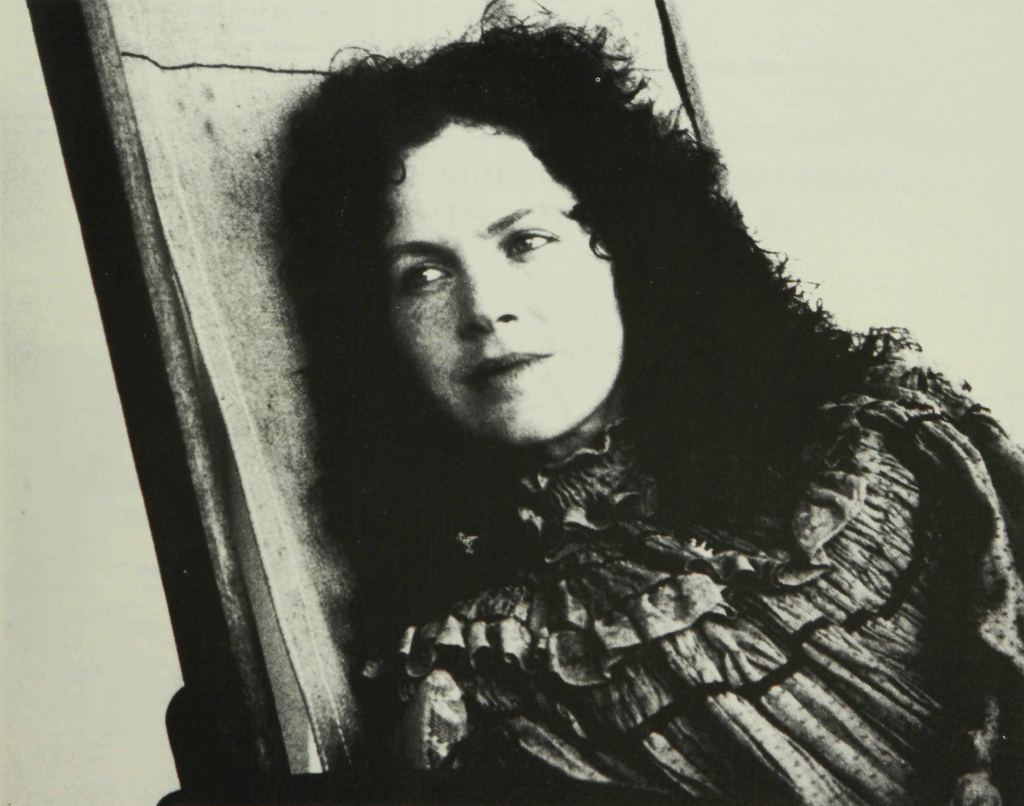
Sexually Charged
These emotions are captured in scenes such as those where Harry and Sybylla play the piano together or where they have a pillow fight. These innocent activities allow accidental but blameless physical contact charged with sexual overtones barely understood by the innocent Sybylla.
This physical frustration finally breaks out from the controls of brother-sisterly games in a scene which could have so easily degenerated into a Mills and Boon Romance Library fiasco. Sybylla, jealous, defiant and humiliated is confronted by a furiously passionate Needham. In reply to his demanding kiss, Sybylla strikes him viciously and hard across the face with a whip. In a reflex action he strikes back. The camera remains on a stunned and shaken Sybylla in anticipation of her reaction, and Judy Davis holds this moment expertly – expressing growing sorrow and shame as she realizes that the whip blow was in fact an abuse of the power suddenly invested in the desired woman.
At this point the film holds its sympathy for Needham, who must face his guests with the badge of the insult, and for Sybylla who, being sexually naive, was unaware of when the games ended and where the mating ritual began.
Sybylla is mortified. She retreats to the garden, her face wet with tears, and the moonlight glistens on her running nose.
Here again, the actress and director avoid the Mills and Boon pitfall by portraying a straightforward human actuality. This is a turning point in the film, as Sybylla’s growing self-knowledge and her awareness of her sexuality make the achievement of her ambition more difficult – and yet more urgent.
The following section of the film follows the maturing of Sybylla as she gains self-discipline firstly in her position as governess to the filthy rich McSwat family, and then on her return to her own family.
The McSwat family do seem to me to be a weakness in the film, a caricature that is hard to accept. However they may be historically accurate, or they may be a product of Miles Franklin’s sharing of the anti-Irish racist views of the time. Nevertheless Sybylla’s isolation is expressed in scenes showing the collision of manners and sensibility, her disgust at the squalor and her inner struggle not to rush back to life with Harry who, she believes, may be about to court her sister.
These sequences are imbued with a humour and compassion typified in a scene where the McSwat children read, by candlelight, a story from the pages of newsprint that paper the walls of the dwelling. One senses a humility and a generosity about Sybylla, who seems to have acquired an inner strength through overcoming deprivation of all that was attractive at ‘Five Bob’.
Sybylla leaves the McSwats, and we find her back on the family farm. The camera skims past the brothers and sisters who have arrived since her departure. We see her pulling a calf out of the mud, gently but with a strength to her composure. Needham approaches and affirms his love and need of her. This is a very tense moment as the film has underlined the ambiguities of the freedoms and restrictions pertaining to different sexes and social positions. Marriage has been shown as indispensable to social ease and position, yet it implies being stuck in the bush with a new baby each year … and sustained misery if the marriage should fail!
Lifelong Loneliness
Ambition is limited by being a woman, more so by being a poor woman, and even more by being a poor, single woman. In accepting Needham, Sybylla might attain the kind of independence and power of her grandmother or of Aunt Gussy. In refusing him, she might be rejecting a great love and choosing lifelong loneliness.
The situation is resolved in accordance with Sybylla’s demonstrated honesty and unselfishness, with a sense of reality that is highlighted by its setting of bare earth and a dead gum tree … a contrast to the cultivated European garden at ‘Five Bob’ where all the attraction began.
The final scene characterizes the strength, style and sensitivity of the film. In the red, silent dawn, Sybylla places her manuscript in the roadside mailbox, and she leans on the fence, her face and body alive with so much identifiable emotion. There is uncertainty, relief, fear, elation, anxiety and loneliness, and above all a courageous joy that takes hope from the dawn.
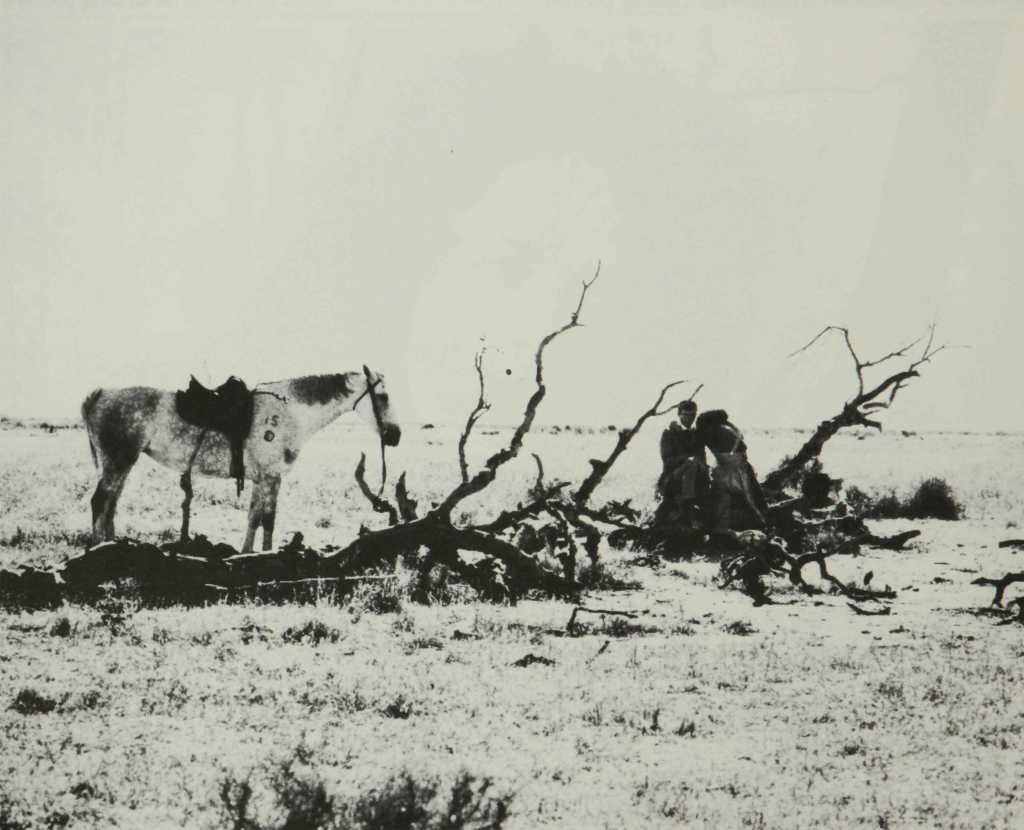
My Brilliant Career is such an impressive film!
It powerfully masters so many elements – from the simple visual metaphor like that of the elegant Victorian bird-cage through the poised, witty observations of social etiquette to the stunning portrayal of Sybylla vacillating from one society to another only to find herself a stranger in both. The design is meticulous and the images carefully composed. Judy Davis calls on a wide emotional range and she graduates Sybylla’s development with great credibility. There are faults, but in view of the film’s rhythmic evenness it wouldn’t be fair to dwell on them here.
Here at long last is an Australian film which is not frightened to portray women in non-stereotyped roles. My Brilliant Career deserves the acclaim it is currently receiving and it must establish a secure place in the school curriculum.
Workbook
1. Why was it so important for Sybylla to have a brilliant career?
2. Sybylla found her physical appearance much to be desired yet she was a very attractive woman. What made her so unacceptable in comparison to other women and fashions of the day?
3. Sybylla didn’t wish to be like her mother, married in the bush with the burden of a new baby each year. What alternative lifestyles existed for women who were single and poor during this period of our history?
4. Do you think that Sybylla would have had the opportunity to write her novel had she married Harry Needham? Which would you have chosen – the marriage or the book? Why?
5. Aunt Helen warned Sybylla that she should never marry for love. Why?
6. Sybylla turned Harry Needham’s marriage proposals down twice in order to accomplish the writing of her book. Do you think she was right in doing so?
7. Were you satisfied with the conclusion of the film? How would you have ended the film?
8. Do you agree with the author that there is a fundamental difference between the ways that women and men experience the emotions of love and sexual attraction?
9. Buy a Mills and Boon Romance Library Book, preferably one written by the side-splittingly romantic Violet Winspear. Two of her best titles are Her Dark Spaniard and Bitter Masquerade. What similarities and differences do you see between these books and My Brilliant Career? Why are they so popular and with whom ? Why don’t men read them?
